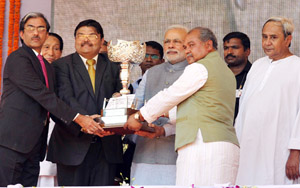Burnpur (West Bengal), May 10: Prime Minister Narendra Modi on Sunday dedicated to the nation the upgraded IISCO Steel Plant (ISP), that houses the country's largest blast furnace and has been modernised by the central government at a cost of Rs.16,000 crore.
After modernisation, the plant's production capacity has increased from 0.85 million tonnes per annum (mtpa) to 2.9 mtpa.
"With immense joy I dedicate to the nation the modernised and expanded IISCO steel plant in Burnpur," Modi said at the function, attended by West Bengal Governor K.N.
Tripathi, Chief Minister Mamata Banerjee, union Minister of State for Steel Narendra Singh Tomar, union Minister of State for Urban Development Babul Supriyo, senior bureaucrats and eminent persons.
Describing the prime minister together with all the chief ministers as "Team India", Modi said the plant showcased that centre and states together can solve all issues.
"This modern plant is an example of how Team India will take the country forward. This plant which was sick, is now standing powerfully on its feet. If the chief minister (Banerjee), the state (West Bengal) government had created hurdles, this wouldn't have been possible.
"This is the effort of team India that we are dedicating this plant to the country," said Modi at the function held at Asansol Polo Ground in Burdwan district.
Tomar said ISP has been reborn.
"(It) has the nation's largest blast furnace with a capacity to produce 2.9 million tonnes of steel. In times to come, the capacity of this steel plant will be increased," he said, adding India plans to attain a capacity to produce 300 million tonnes of steel by 2025 to meet industry demand.
"SAIL has set a target to achieve a production capacity of 50 million tonnes. As its capacity increases, West Bengal will benefit from it," he said.
The minister said the Durgapur steel plant of SAIL in the same district is also very old. "When the expansion and modernisation phase of the Durgapur plant starts, there will be an investment of Rs.35,000 crore in West Bengal."
Banerjee urged the central government to speed up the process of expanding SAIL's operations in Durgapur.
She recalled that there were talks of privatising IISCO in the past."This made the IISCO workers very downcast. In 1998, when we were supporting from outside the first NDA government of Atal Bihari Vajpayee, we had asked for a Bengal package. There we demanded that IISCO be modernised. It was then that the project was approved. The work that began in 2006-7 has now been completed."
Banerjee's Trinamool Congress said on its official Twitter handle that the state government has given 3,000 acres of land for the modernisation of the IISCO plant and another project by SAIL.
Indian Iron and Steel Company (IISCO) was taken over by the central government in 1972 as part of a nationalisation drive and made a fully-owned subsidiary of SAIL in 1978. It was thereafter renamed ISP.
The revamped plant in Burnpur is spread across 953 acres. It is the fifth integrated steel plant of SAIL.
A statement from SAIL said: "The modernised and expanded plant would produce high quality steel rebars including earthquake-resistant grades, wire rods and universal sections, including parallel flanged beams, for fulfilling the need of India's growing infrastructure and construction sector."





Comments
Add new comment